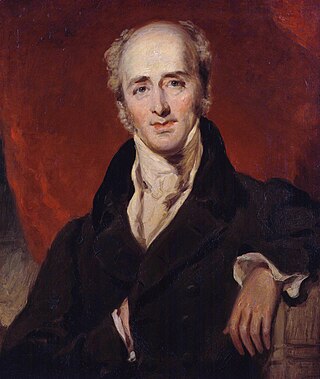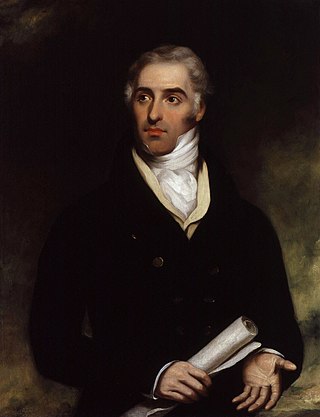Related Research Articles

The 1832 United Kingdom general election was the first United Kingdom general election held in the Reformed House of Commons following the Reform Act. The election saw the Whigs win an overall majority of 224 seats, with the Tories winning less than 30% of the vote. This was the last election before the Tories formally reconstituted themselves into the Conservatives, and the last time until 1906 that they won fewer than 200 seats.
Catholic emancipation or Catholic relief was a process in the kingdoms of Great Britain and Ireland, and later the combined United Kingdom in the late 18th century and early 19th century, that involved reducing and removing many of the restrictions on Roman Catholics introduced by the Act of Uniformity, the Test Acts and the penal laws. Requirements to abjure (renounce) the temporal and spiritual authority of the pope and transubstantiation placed major burdens on Roman Catholics.

Sir Michael Alan Penning is a British Conservative Party politician, who served as the Member of Parliament (MP) for Hemel Hempstead from 2005 to 2024.
Cashel is a former British Parliament constituency in Ireland, returning one MP. It was an original constituency represented in Parliament when the Union of Great Britain and Ireland took effect on 1 January 1801.
Grampound in Cornwall was a borough constituency of the House of Commons of the Parliament of England, then of the Parliament of Great Britain from 1707 to 1800 and of the Parliament of the United Kingdom from 1801 to 1826. It was represented by two Members of Parliament.
John Leslie Foster, FRS was an Irish barrister, judge and Tory Member of Parliament (MP) in the United Kingdom Parliament. In 1830 he was appointed a Baron of the Court of Exchequer of Ireland.

William Holmes was an Irish Tory and Conservative politician in the United Kingdom in the early nineteenth century. He was an MP for 28 years.

Michael Thomas Sadler was a British Tory Member of Parliament (MP) whose Evangelical Anglicanism and prior experience as a Poor Law administrator in Leeds led him to oppose Malthusian theories of population and their use to decry state provision for the poor.

Sir Manasseh Masseh Lopes, 1st Baronet, of Maristow in the parish of Tamerton Foliot, Devon, was a British Member of Parliament and borough-monger.
Sir Christopher Hawkins, 1st Baronet, FRS was a Cornish landowner, mine-owner, Tory Member of Parliament, and patron of steam power. He was Recorder of Grampound, of Tregony, and of St Ives, Cornwall.

The 1818 United States House of Representatives elections in New York were held from April 28 to 30, 1818, to elect 27 U.S. Representatives to represent the State of New York in the United States House of Representatives of the 16th United States Congress.

John Charles Ramsden was a British Whig politician from Newby Park in Yorkshire. He had a seat in the House of Commons between 1812 and 1836.
John Henry North was an Irish barrister, judge and Canningite Tory Member of Parliament (MP) in the United Kingdom Parliament.
Miles Barne was an English land-owner and a Member of Parliament for Dunwich between 1747 and 1754, and again between 1764 and 1777. Born into a family long associated with London merchant circles, Barne accumulated sufficient wealth to purchase an estate in Suffolk and became prominent amongst local freeman. Dunwich in Suffolk, his constituency, was a pocket borough, controlled by the Downing land-owning family; Barne, the local Vanneck family and the freemen of the borough slowly ousted the Downings' influence and Barne established himself as one of the town's new members, which gave his family the seat until it was abolished in the 1832 Reforms.
James Blair was an Irish planter and politician. He entered the Parliament of the United Kingdom as a Tory in 1818 to protect the interests of the West Indian planter class. Blair sat in the House of Commons from 1818 to 1830, and later from 1837 to 1841. When slave owners in the British Empire were compensated for the abolition of slavery in Britain's colonies in 1833, Blair received the biggest single compensation payment.
Admiral Theobald Jones, also known as Toby Jones, was an Irish officer in the British Royal Navy, a Tory politician, a noted lichenologist, and a fossil-collector. The County Londonderry-born son of a Church of Ireland clergyman, Jones was descended from a 17th-century Welsh settler in Ireland. Several generations of his family had held public office in the Kingdom of Ireland, including membership of the pre-union Parliament of Ireland.
Alsager Hay Hill was an English social reformer active during the late 19th century, influential on poor law reform and employment issues. He founded one of the first labour exchanges and, in 1871, a newspaper, Labour News, that is still published today as Construction News.
Thomas Barrett-Lennard was a British Whig politician.

John Collett was an Irish Whig politician.
John Innes (1767–1838) was a Scottish merchant and politician, Member of Parliament for Grampound from 1818, to the constituency's disenfranchisement for corruption.
References
- 1 2 3 4 5 Salmon, Philip. "COLLETT, Ebenezer John (1755-1833), of Lockers House, Hemel Hempstead, Herts. and 19 Great George Street, Mdx". The History of Parliament: the House of Commons 1820-1832. Cambridge University Press. Retrieved 9 January 2017.
- ↑ Scott, John (1839). Cases in the Court of Common Pleas and Exchequer Chamber [1834-1840]. S Sweet. p. 409.
- 1 2 "COLLETT, Hemel Hempstead, 1740-1870". Hertfordshire Genealogy. Retrieved 9 January 2017.